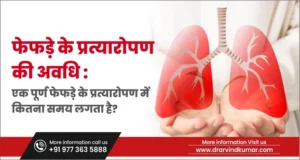Can you live a normal life after a lung transplant? If you are wondering the same thing, you aren the only one.
A lung transplant majorly impacts your life. While it helps eliminate a potentially fatal pulmonary condition, it also entails a lifetime of care and precautions. The transplant process, starting from diagnosis and finding a donor to the actual surgery and recovery, is time-taking and emotionally exhausting. After going through all this, it is expected that you would want nothing more than to return to your normal life.
But is it possible? Can you go back to living a normal life after this major surgery? The answer is yes, but there are conditions involved.
You can return to work or school, travel with your family and friends, and eat your favorite food. However, moderation is the key here. You must know when to stop, when to seek help, and what to avoid.
The following pointers describe the measures and steps you need to take to help you lead a normal life after a lung transplant.
1. Routine Check-ups
Major surgery like a transplant and the medications that follow make your body somewhat weak and more vulnerable. Hence, visiting your doctor for routine check-ups is necessary.
These visits would help you know how your body is reacting to the surgery and whether there are any side effects of the medications. If the doctor notices anything abnormal, they can take immediate action before it gets serious.
While recovering after the transplant, we advise you to get monthly check-ups. Later, when your health is more stable, you can schedule these visits a few months apart. Talk to your doctor about the most suitable schedule for you.
2. Exercise
The wonders of exercise aren a secret. And this applies in the case of lung transplants too. Studies have proved that regular exercise improves the functioning of your heart and lungs.
Exercise helps improve muscle tone, maintain ideal body weight, and reduce mental and emotional stress. All of this contributes to your overall well-being.
Its best to talk to your transplant team about the best exercise routine. We advise you to begin with light physical activities like walking and jogging. Avoid strenuous activities like weightlifting that put too much stress on your heart and lungs.
3. Getting Back To Work/School
It could take anywhere between 3 to 6 months for you to return to your work/school. This depends on your recovery rate and how your body responds to the transplanted lung.
It would be best if you got a green signal from your transplant team before returning to your normal work routine. Also, take it easy for a few weeks in the beginning. Avoid driving alone and by yourself.
4. Dental Hygiene
Your nasal and oral cavities are joined at the pharynx. Hence, poor dental hygiene could lead to lung infections. Due to the immunosuppressants and other medications, your body is more prone to infection.
If you have any dental work pending, get it done before the transplant. After the surgery, avoid dental treatment, including teeth whitening, for at least 6 months. In case of an emergency, consult your transplant team before getting the treatment. They might prescribe you some antibiotics and ask you to take some precautions.
5. Skincare
This could be unexpected, but you might face skin-related issues after a transplant. Some medications like Prednisone make your skin more prone to acne. This could occur on the face, chest, or back. Some people also experience dry skin.
Use mild soap and avoid rubbing your skin harshly. Instead, make a habit of gently scrubbing your skin and patting it dry. Use moisturizing lotions and avoid products with high chemical content. Use sunscreen multiple times a day, even when staying indoors.
6. Haircare
You might experience dry hair and too much hair fall after a lung transplant. Medications like Prednisone weaken the hair, so they break or fall more easily. Other medications like Cyclosporin promote hair growth, including body hair. This could be a problem for girls.
Using a mild shampoo and keeping your hair clean and moisturized could help. Also, avoid getting hair treatments, including dying and bleaching.
7. Smoking And Alcohol
We advise you against smoking and consuming alcohol. Smoking directly impacts your lungs and could make them weak and more prone to infection.
Alcohol is processed in the liver, as are the medications you take. Their interaction in the liver could cause serious side effects.
You should also avoid some non-alcoholic beverages as much as possible.
8. Cancer And Other Diseases
A lung transplant requires you to take immunosuppressants for your whole life. This makes your body more prone to cancer. Skin cancer is the most common form of cancer reported in lung transplant patients.
Perform a regular self-examination of your breasts/testicles. Also, include appropriate physical examination and screening tests during your routine check-ups at the doctor. Apply sunscreen multiple times a day and wear sleeved garments when going out.
9. Sexual Life And Pregnancy
The medications given after a lung transplant can affect your libido and other aspects of your sexual life. These effects could be physical or emotional. We advise you to abstain from sexual activities for at least 4 to 6 weeks. You can discuss your issues and insecurities with your partner during this period.
If you are a female and want to get pregnant, wait for at least one year after the transplant. Even then, there are high chances of complications during the pregnancy. In such cases, youd need to be in regular contact with your gynecologist and the transplant team.
The Bottom Line
As discussed above, the answer to “Can you live a normal life after a lung transplant” is subjective. This major surgery is accompanied by regular medications, several precautions, and major lifestyle changes. However, if you are willing to accept and embrace these changes for a healthier life, you can live a pretty normal life doing things you want and love to do.
Dr. Arvind Kumar is a renowned name in the field of lung transplants and surgeries. With over 40 years of hands-on experience in the medical field, he is proficient in managing the transplant process and guiding recovery to reduce the risk of complications. He has been awarded the Dr. B. C. Roy National Award for his remarkable expertise in the medical field.
For more details about Dr. Arvind Kumar services, you can reach out at @+91 9773635888.

.webp)



